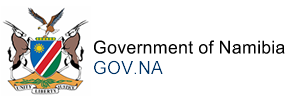ABOUT GOVERNMENT - Gov.na
Head of State and Government
The President shall be the head of state and of the Government and the Commander-in Chief of the Defence Force.

President H.E Dr. Netumbo Nandi Ndaitwah
H.E Dr. Netumbo Nandi Ndaitwah is the First Female President of the Republic of Namibia. She was sworn-in on Friday, 21st March 2025.
She succeeded, H.E Dr. Nangolo Mbumba, the fourth President of the Republic of Namibia
The Executive Power of the Republic of Namibia shall vest in the President and the Cabinet. Except as may be otherwise provided in the constitution or by law, the President shall in the excersice of his or her functions be obliged to act in consultation with the cabinet. Office of the President
Cabinet
Composition (Article 35 of the Namibia Constitution)
"The Cabinet shall consist of the President, the Prime Minister and such other Ministers as the President may appoint from the members of the National Assembly, including members nominated under Article 46(1)(b) hereof, for the purpose of administering and executing the functions of the Government.
The President may also appoint a Deputy Prime Minister to perform such functions as may be assigned to him or her by the President or the Prime Minister."
Cabinet Members
- President: Dr. Netumbo Nandi Ndaitwah
- Vice President: Lucia Witbooi
- Prime Minister: Dr. Elijah Ngurare
- Deputy Prime Minister & Minister of Mines, Energy and Industry: Natangwe Ithete
- Minister of International Relations and Trade: Selma Ashipala-Musavyi
- Minister of Gender Equality and Child Welfare: Dr. Emma Kantema
- Minister of Agriculture, Fisheries, Water and Land Reform: Inge Zaamwani-Kamwi
- Minister of Defence and Veterans Affairs: Frans Kapofi
- Minister of Environment and Tourism: Indileni Daniel
- Ministry of Works and Transport: Viekko Nekundi
- Minister of Finance and Social Grants Management: Erica Shafudah
- Minister of Health and Social Services: Dr. Esperance Luvindao
- Minister of Home Affairs, Immigration, Safety and Security: Lucia Iipumbu
- Minister of Education, Innovation, Youth, Sport, Art and Culture: Sanet Steenkamp
- Minister of Information and Communications Technology: Emma Theofelus
- Minister of Justice and Labour Relations: Fillemon Wise Emmanuel
- Minister of Urban and Rural Development: James Sankwasa
- Attorney General: Festus Mbandeka
- Director General of the National Planning: Kaire Mbuende
- Director General of the Intelligence Service: Benedictus Likando
- Secretary to Cabinet: George Simata
Ministers
14 Cabinet Ministers
All ministers shall be accountable individually for the administration of their ministries and collectively for the administration of the work of the cabinet, both to the President and to Parliament.
7 Deputy Ministers
The president may appoint from the members of the National Assembly, including membersnominated under Article46(1)(b) hereof, and the National Council such Deputy-Ministers as he or she may consider expedient, to excersice or perform on behalf of Ministers any of the powers, functions and duties which may have been assigned to such Ministers.
The Government
The government is run through departments, office, agencies and other entities. They implement policies to support the public. Office include the Office of the President, Vice President and the Prime Minister. Ministerial departments cover the whole of Namibia, except the vice presidents' office that only applies to marginalised communities and war survivors. Parastatals focus on providing services then implementing policies.
3 Offices + 14 Ministries + 8 Agencies + 41 Parastatals
Civil Service
The Civil Service does the practical and administrative work of government. It is co-ordinated and managed by the different appointed ministers and CEOs. More than half of all civil servants provide services direct to the public, including:
- paying benefits and pensions
- running employment services
- staffing prisons
- providing identification
State Organ
The Republic of Namibia attained its independence on 21 March 1990 and was established as a sovereign, secular, democratic and unitary State. In accordance with the doctrine of separation of powers, the government is divided into three organs:
- The Executive
- The Legislative
- The Judiciary
Each organ is responsible for a different function of the government. The legislative branch is responsible for making laws which are implemented by the executive and interpreted by the judiciary branch.
Regional Government
Namibia is divided into 14 regions and subdivided into 121 constituencies. Each constituency votes for one councilor for the regional council of each region. There are 14 regional councils, corresponding to the 14 regions of Namibia. See also Decentralization in Namibia.
Security
The Security Services of Namibia, being both the Police and the Military, have the principle aim of ensuring your safety and security.
| Article 118 of the Constitution of the Republic of Namibia provides for the establishment by the Act of Parliament a Namibian Defence Force with prescribed composition, powers, duties and procedures in order to defend the territory and national interest of Namibia. | Article 115 of the Constitution of the Republic of Namibia provides for the establishment by the Act of Parliament a Namibian police force with prescribed powers, duties and procedures in order to secure the internal security of Namibia and to maintain law and order. | In terms of Entries No. 1 and 2 of List in the Seventh Schedule to the Constitution of Namibia, 'public order' and 'police' are the responsibilities of States. At the same time, Article 355 of the Constitution of Namibia casts a duty on the Union to protect every State against external aggression. |
